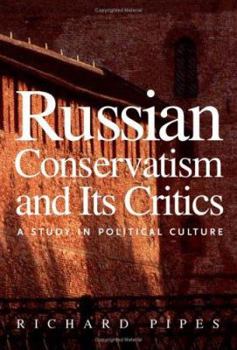Russian Conservatism and Its Critics: A Study in Political Culture
Select Format
Select Condition 
Book Overview
Why have Russians chosen unlimited autocracy throughout their history? Why is democracy unable to flourish in Russia? Russian Conservatism and Its Critics provides the first account of Russia's... This description may be from another edition of this product.
Format:Hardcover
Language:English
ISBN:0300112882
ISBN13:9780300112887
Release Date:January 2006
Publisher:Yale University Press
Length:216 Pages
Weight:1.05 lbs.
Dimensions:0.9" x 6.4" x 9.4"
Customer Reviews
2 ratings
The Continuity of Authoritarian Government in Russia
Published by Thriftbooks.com User , 17 years ago
Russian Conservatism and Its Critics, by Professor Richard Pipes, traces the intellectual history of Russian political thought from the late middle ages through the twentieth century. As Pipes observes early in the book, one must be careful to define what one means when using the terms such as "conservative" or "liberal". In his context, Russian conservatism connotes the pattern of strong, centralized, authoritarian government that has dominated Russia's history from early Muscovy to Vladimir Putin, with brief respites in period between the 1905 and 1917 revolutions and under Boris Yeltsin. Pipes demonstrates the strong degree of continuity in Russian political thought and practice across 500 years. Both the totalitarian nature of the Soviet regime and Putin's increasingly centralized and authoritarian rule can be better understood as directly descended from centuries old Russian political patterns. A few key points from Russian Conservatism include: * Early Muscovite Tsars did not differentiate between the state and their personal property - they literally "owned" Russia, including both the land and it people. As late as the early 19th century, political thinkers wrote that the nobles were the slaves of the tsar and the serfs were the slaves of the nobles. * Peter the Great westernized Russia by opening it to western ideas, but he and subsequent "liberal" rulers neither accepted nor tolerated even the most limited concepts of popular sovereignty. Western concepts such as Natural Law were actually used to justify the Tsar's absolute power. * Peter also created the Table of Orders which established the hierarchy of the state bureaucracy. Under this scheme, the highest levels automatically became nobles, regardless of their prior social status, thereby diluting the exclusiveness of the old nobility. This process created a split in the nobility which effectively prevented it from presenting an effective challenge to the Tsar's absolute authority. Perhaps it also set the precedent for the bureaucracy's dominance in the Soviet era. * In the west, the Catholic Church acted as a brake on the power of the monarchies by insisting that kings should rule (at least in part) in the interest of their subjects. In Russia, the church was co-opted into supporting tsarist autocracy. In the debate between the non-possessors and the possessors over whether monasteries should possess property, the tsar sided with the possessors, allowing them to retain their landed estates. In return, the church supported unlimited tsarist power. * Western feudalism was a two-way street: the feudal lord could expect service from his retainers but was also obligated to provide them with protection - failure by either party could be grounds for termination of the feudal obligations of the other party. In Russia, feudalism was a strictly on-way street: Everyone owed service to the Tsar, who owed nothing to his subjects. Russian Conservatism touches on themes that Pipes presented in hi
NOT EVERYTHING SHOULD BE CONSERVED
Published by Thriftbooks.com User , 18 years ago
It is perhaps sufficiently self-evident by now that we will not stand accused of mere jingoism when we say that most of the ideas necessary to the End of History were encapsulated in less than a paragraph some two hundred and thirty years ago: We hold these truths to be self-evident, that all men are created equal, that they are endowed by their Creator with certain unalienable Rights, that among these are Life, Liberty and the pursuit of Happiness. --That to secure these rights, Governments are instituted among Men, deriving their just powers from the consent of the governed, --That whenever any Form of Government becomes destructive of these ends, it is the Right of the People to alter or to abolish it, and to institute new Government, laying its foundation on such principles and organizing its powers in such form, as to them shall seem most likely to effect their Safety and Happiness. Indeed, that's such idea-rich terrain that we're unlikely to be able to address them all, but let's pluck out just a few of the key ones: (1) Human dignity comes from our Creation by God. (2) As a result of that Creation, all Men begin life as moral equals. (3) God grants us Rights that precede any human institutions and can not be justly compromised by any such. (4) Governments are, in fact, created by Men in order to safeguard human dignity and vindicate those Rights. (5) Legitimate government, then, can be said to serve God's ends and to require the consent of the governed. Any government that does not do both is by its very nature illegitimate. So pervasive are these ideas that, for instance, I just happened to be reading a book, The Case for Goliath, by a rather non-partisan/non-ideological foreign policy wonk, Michael Mandelbaum, wherein he states as a fact: Government is not the essence of social life. In human affairs it is secondary, emerging from, and playing a supporting role for, what is primary: the social relations and the norms they embody that make up society. Thereby he dismisses, quite correctly, all of the competing ideologies of government to our own ideal of liberal/parliamentary/republican democracy. The recent competitors--well worth dismissing--have been Nazism, communism/socialism, and Islamicism. But the original competitors were autocracies, which not only viewed government as primary but located that government in the person of one ruler. The longest lived of these despotisms, at least in the West, was the tsardom of Russia and it is this tragic phenomenon that Mr. Pipes explores here.






